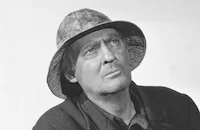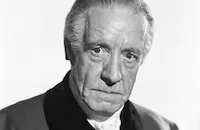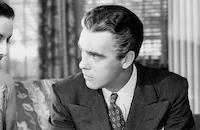Bannerline

Brief Synopsis
Cast & Crew
Don Weis
Keefe Brasselle
Sally Forrest
Lionel Barrymore
Lewis Stone
J. Carrol Naish
Film Details
Technical Specs

Synopsis
Carravia Clarion cub reporter Mike Perrivale yearns for a chance to prove his mettle on a major story, but editor Roy and publisher Stambaugh will not give the college-educated Mike a chance. Still optimistic that he can do something more than cover the local garden club, Mike plans to marry his school teacher girl friend, Richie Loomis, within a year. Richie's mother is against the marriage, even though she is fond of Mike, because she fears that Richie will be confined to a life of privation, just as she had been. The idealistic Richie is committed to Mike, though, and refuses to consider anyone else. One night, Richie suggests that Mike ask Stambaugh to let him write a story about Hugo Trimble, the high school's longtime history teacher, who is near death in the hospital. Stambaugh and Roy are unenthusiastic, but as they, like the rest of the town, were taught by the tough, but fair Trimble, they agree to allow Mike to write a small piece after interviewing Trimble and his wife Margaret. The devoted Margaret admires her husband for his idealism and hard work, but sadly says that Hugo is a failure, because he never convinced the people of Carravia to take action against gangster Frankie Scarbine, who runs the town. When Mike interviews Hugo, he is inspired by the eloquent teacher and wonders what it would be like if the town would take Hugo's advice and follow the principles of the Founding Fathers. Knowing that the disillusioned Hugo has only a day or two to live, Mike proposes to Stambaugh that they create a phony front page proclaiming changes in the town leadership and indicate that Scarbine is on his way out. At first reluctant, Stambaugh eventually agrees and he, Mike, Roy and Josh, an elderly former reporter who now heads the paper's morgue, work all night on phony stories about grand juries and resignations of the corrupt city officials. Each takes a souvenier copy, and Mike makes sure that one is delivered to Hugo. Next morning, when Mike goes to the hospital, Hugo is touched by Mike's gesture, but reveals he knew instantly that it was a ruse as the townspeople are too apathetic to take action against Scarbine. Mike begins to think about the ideas expressed in the phony front page and, when at the Club Africa, a gambling joint run by Scarbine's henchman Floyd, he encounters Josh. As they drink together, Josh, who wasted his once brilliant career on alcohol, is convinced by Mike to take the already set front page and print it on all of the next day's papers. While the printers are on their dinner break, Josh and Mike fix the presses and the next morning every issue of the Clarion carries the phony front page. When Mike wakes up with a terrible hangover and sees the paper, he remembers what he has done and fears that he will lose his job. Stambaugh, who is honest, but weak, does not fire him, because no one in the apathetic town was inspired by the headline. Scarbine then enters Stambaugh's office to complain. When Mike stands up to him, Scarbine is impressed and asks him to take him to see Hugo. At the hospital, Hugo admits to liking Scarbine, who can be charming, but warns that someday a runaway grand jury will stop him. Later, Floyd suggests killing Hugo and Margaret, but Scarbine, remembering Margaret's kindness to him and his family when he was a child, refuses to allow it. He does say that Mike might someday get a "rap in the mouth," which Floyd interprets as an order. Meanwhile, Mike goes to the library to read up on runaway grand juries and proposes to Stambaugh that they try to convince the present head of the town's grand jury, Dick Moore, to take action. Stambaugh is on the verge of agreeing, when Scarbine calls to say that Mike must be fired. That night, Richie says that she will follow Mike anywhere, and Mrs. Loomis finally accepts their impending marriage. To celebrate, Mike goes out to buy a bottle of champagne, but on the drive back, is forced over by a car and confronted by Floyd and his thugs, who mercilessly beat him. Later, when Scarbine finds out what has happened, he is enraged that Floyd misinterpreted him. When Josh learns about Mike, he drags Stambaugh out of bed and together they successfully approach the grand jury. Next morning, the badly injured Mike is in the hospital, where he finds out that the town has finally been inspired to take action. The mayor and city council resigned after the grand jury issued subpoenas to them, and Scarbine and his gang have left town. Sadly, Margaret informs Mike that Hugo died, but not before learning of the changes in Carravia. Stambaugh then informs Mike that he is being given a large raise for more important assignments, thus enabling him and Richie to marry.

Director
Don Weis
Cast

Keefe Brasselle

Sally Forrest

Lionel Barrymore

Lewis Stone

J. Carrol Naish

Larry Keating

Spring Byington

Warner Anderson

Elisabeth Risdon

Michael Ansara
John Morgan

Mari Blanchard
Tom Murray
George Magrill
Jack Shea
David Macmahon
Allan Ray
Larry Dobkin
William E. Green
William Schallert
Joan Blake
Betty Erbes
Janice Carroll
Phyllis Woodward
Sumner Getchell
Ida Moore
Bob Alden
Helen Winston
Jeanne Dante
Harry Cheshire
Budd Fine
David March
Nolan Leary
Harvey Dunn
Rhea Mitchell
Virginia Farmer
James Base
Phil Bloom
Betsy Stoddard
Genevieve Bell
Helen Dickson
Nikki Juston

Sylvia Andrew
Jesse Arnold
Crew
Henry Berman
Norwood Fenton
Cedric Gibbons
Sydney Guilaroff
Rudolph G. Kopp
Harold Lipstein
Arthur Lonergan
Samson Raphaelson
George Rhein
Charles Schnee
Douglas Shearer
Al Shenberg
Fredrick Y. Smith
Alfred E. Spencer
William Tuttle
Edwin B. Willis

Film Details
Technical Specs

Articles
Bannerline
By Richard Harland Smith

Bannerline
Quotes
Trivia
Notes
Bannerline marked the M-G-M producing debut of Henry Berman and the first film as a director by Don Weis (1922-2000), who had previously acted as a dialogue director on many productions. Weis went on to direct several films for M-G-M in the 1950s, then turned to television, where he directed numerous episodes of popular series for more than thirty years, including Alfred Hitchcock Presents and Remington Steele. According to an M-G-M press release, Bannerline was intended as the directing debut of Charles Schnee, but Schnee only wrote the screenplay.















